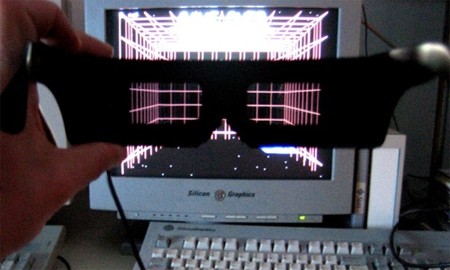
[Mark Hoekstra] is a true SGI enthusiast, and he proves it with these 3D glasses for an SGI. Taking advantage of the SGI’s stereo viewport, [Hoekstra] created a controller for a pair of CrystalEyes glasses that would allow them to be used with the SGI.
[Hoekstra] used the schematic from [M.C.D. Roos]’s similar project, which used old Asus 3D VR glasses. This project can theoretically be done with any LCD-shutter glasses, the only important thing to know is the maximum shutter voltage the glasses will take. [Hoekstra] felt his way through building the board by common sense alone and somehow managed to avoid any shorts. The board only makes three connections to the glasses: an out to the left lens, one to the right, and a ground wire. After building the controller board out of an LM324 chip and a customized segment of perf board, he learned that he needed a monitor capable of displaying a relatively high bit depth at 100Hz, or 50Hz per eye. He tested the glasses with a game called Hacknoid after making a few last minute changes on the board (forgot the ground fuse), and he was soon making himself dizzy with his functioning 3D glasses.















I’m glad to see some SGI love, especially from Mark.
Also, english isn’t my first language, but isn’t “an SGI” wrong…?
I had no idea such glasses existed – and are so cheap! how hard would it be to connect a pair to a more recent machine/graphics card?
the renderer would have to be frame-locked with the display (unlike most games that pump out as many frames as they can), not to mention render to a different camera every other frame. you would need some way to accurately synchronize the display frame switching with the glasses. serial/usb might be too slow/have too much latency, so maybe tap into the monitor’s refresh signal?
@spock128:
LCD Shutter-glasses have been around at least since the early nineties. And you’re right about it having to be frame-locked with the display – no amount of coding in software land will get you desirable results.
IIRC, some older commercial cards (Voodoo2 I think) actually came *with* glasses like this, but they never really caught on. They had a dedicated port (1/8 jack) on the card to handle all this.
A superior hack would be to somehow snoop the VGA signals coming from a more recent card (like on the port itself) in order to drive the shutters on just about any hardware imaginable; just use a pic to listen for vsync and bob’s your uncle. Then it’s just a matter of providing a switch to flip which shutter (L or R) is dominant since there would be no way to know which frame (L or R) is being rendered.
i had the exact same glasses bundled with a gforce 256.
apart from the endless tweaking and headaches, it worked. The only problem is that games had to render one frame for each eye so framerate dropped by half.
@2: Actually it’s correct. “An” is used when the beginning sound of a given word has a vowel sound, such as “entry” or “honor”. In the case of “SGI”, the letter ‘S’ is pronounced “Ess”, so “an” is the correct form of the word.